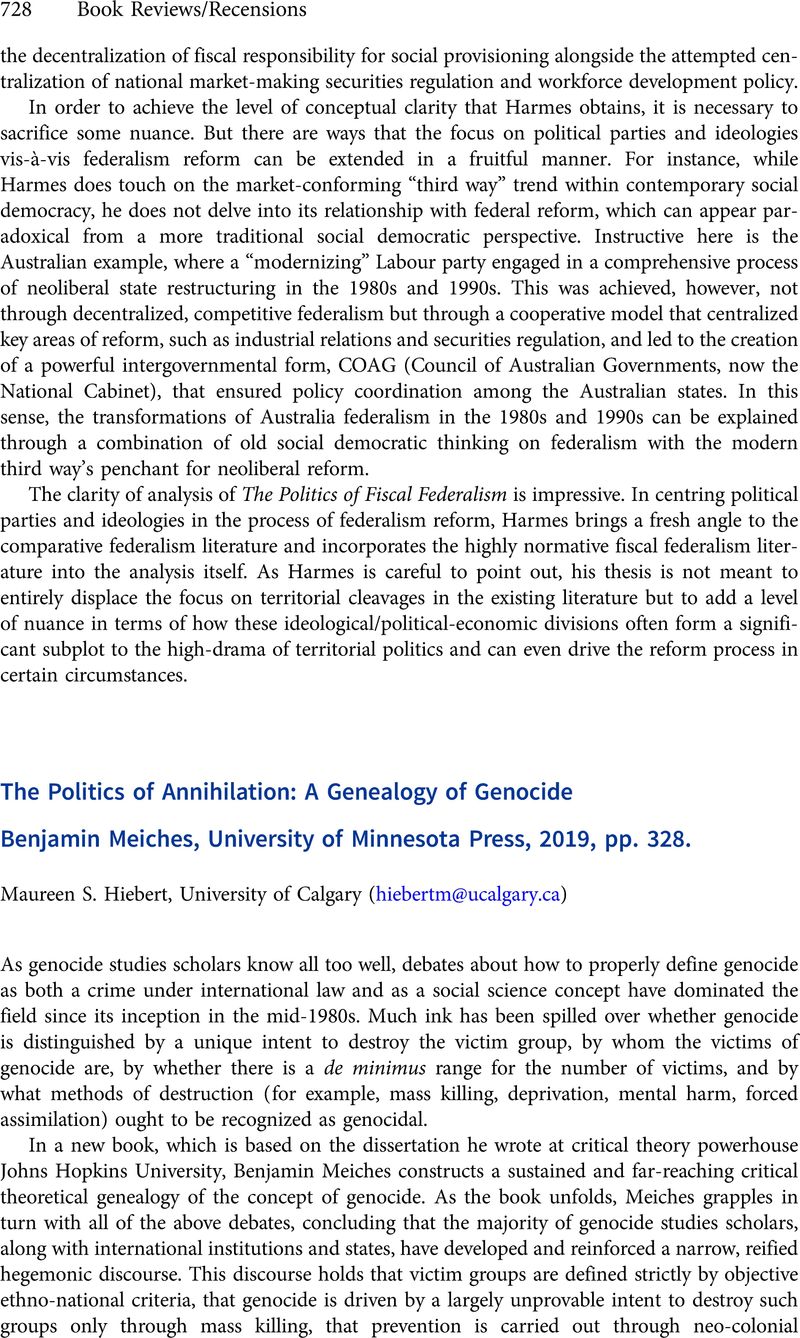No CrossRef data available.
Article contents
The Politics of Annihilation: A Genealogy of Genocide Benjamin Meiches, University of Minnesota Press, 2019, pp. 328.
Review products
The Politics of Annihilation: A Genealogy of Genocide Benjamin Meiches, University of Minnesota Press, 2019, pp. 328.
Published online by Cambridge University Press: 12 August 2020
Abstract
An abstract is not available for this content so a preview has been provided. Please use the Get access link above for information on how to access this content.

- Type
- Book Review/Recension
- Information
- Canadian Journal of Political Science/Revue canadienne de science politique , Volume 53 , Issue 3 , September 2020 , pp. 728 - 730
- Copyright
- Copyright © Canadian Political Science Association (l'Association canadienne de science politique) and/et la Société québécoise de science politique 2020
References
Bloxham, Donald. 2009. The Final Solution: A Genocide. Oxford: Oxford University Press.Google Scholar
Brown, Sara E. 2014. “Female Perpetrators of the Rwanda Genocide.” International Feminist Journal of Politics 16 (3): 448–69.CrossRefGoogle Scholar
Browning, Christopher. 1998. Ordinary Men: Reserve Police Battalion 101 and the Final Solution in Poland. New York: Harper Perennial.Google Scholar
Chirot, Daniel and McCauley, Clark. 2010. Why Not Kill Them All? The Logic and Prevention of Mass Political Murder. Princeton: Princeton University Press.Google Scholar
Hiebert, Maureen S. 2013. “Questioning Boundaries: What's Old and What's New in Comparative Genocide Theory.” In Genocide Matters: Ongoing Issues and Emerging Perspectives, ed. Apsel, Joyce and Verdeja, Ernesto. New York: Routledge.Google Scholar
Jones, Adam, ed. 2012. New Directions in Genocide Research. New York: Routledge.CrossRefGoogle Scholar
Moses, A. Dirk, ed. 2008. Empire, Colony, Genocide: Conquest, Occupation, and Subaltern Resistance in World History. New York: Berghahn Books.Google Scholar
Stone, Dan., ed. 2008. The Historiography of Genocide. New York: Palgrave MacMillan.CrossRefGoogle Scholar
Straus, Scott. 2008. The Order of Genocide: Race, Power, and War in Rwanda. Ithaca: Cornell University Press.Google Scholar
Thompson, Susan and Nagy, Rosemary. 2011. “Law, Power, and Justice: What Legalism Fails to Address in the Functioning of Rwanda's Gacaca Courts.” International Journal of Transitional Justice 5 (1): 11–30.CrossRefGoogle Scholar
Tyner, James A. 2017. From Rice Fields to Killing Fields: Nature, Life, and Labor under the Khmer Rouge. Syracuse: Syracuse University Press.CrossRefGoogle Scholar
Waller, James. 2002. Becoming Evil: How Ordinary People Commit Genocide and Mass Killing. Oxford: Oxford University Press.Google Scholar
Wildcat, Matthew. 2015. “Fearing Social and Cultural Death: Genocide and Elimination in Settler Colonial Canada—An Indigenous Perspective.” Journal of Genocide Research 17 (4): 391–409.CrossRefGoogle Scholar




